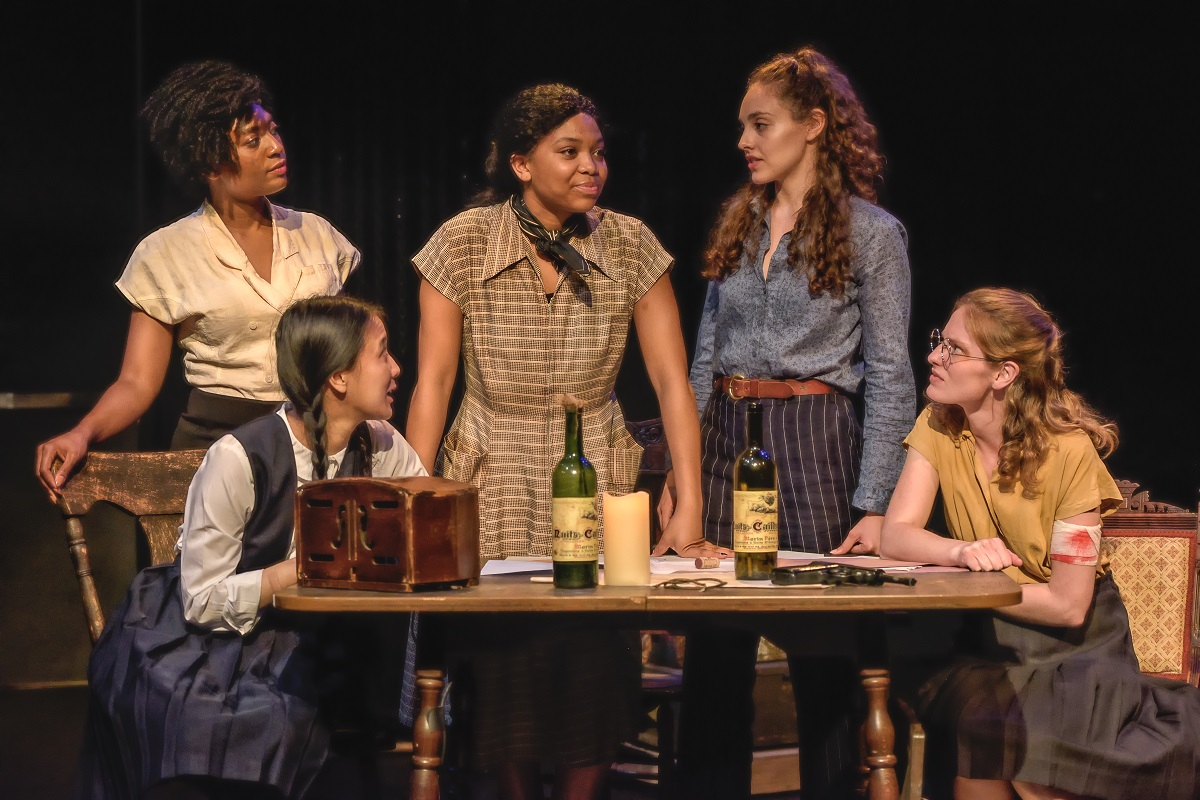
Three Musketeers 1941
Written by Megan Monaghan Rivas
Co-directed by Michole Biancosino and Andrew William Smith
Presented by Project Y Theatre at A.R.T./New York Theatres, NYC
June 5-29th, 2019
Alexandre Dumas's 1844 The Three Musketeers, while a romantic novel of adventure, also includes critique of political corruption and abuses, as well as military violence between Protestants and Catholics. In Three Musketeers 1941, a world premiere commissioned for the fourth annual Project Y Women in Theatre Festival (the full program of shows for the WIT Festival can be found on Project Y Theatre's website), playwright Megan Monaghan Rivas transplants elements of Dumas's text to occupied Paris during World War II for a tightly written and skillfully staged thriller.
Rivas's Musketeers are an all-woman cell of the French Resistance, all of whom are known only by codenames so that if any one of them is captured by the Nazis or their French collaborators, she cannot give up her fellows. Porthos (Kate Margalite) has an exceptional memory and hails from a family of coal miners; Aramis (Ashley Bufkin) and her family are Communists -- whom, she points out, were the first group to resist -- and she is the group's only mother; Athos (Ella Dershowitz) is a former law student; and Planchet (Christina Liang) is the cell’s 16 year-old courier, who uses her bicycle to the cell's advantage. The four are overseen by Madame Treville (Joleen Wilkinson), a Latin teacher, and have been publishing coded messages from the radio in a newsletter. As the play opens, Mme. Treville has invited a fifth young woman, D'Artagnan (Essence Stiggers), a farmgirl whose mother she knew as a child, to join the cell, an addition which Aramis is extremely reluctant to accept. The cell has been assigned to help a British agent, codenamed Buckingham, to escape Paris, but arrayed against them are collaborators police Inspector Richelieu (Zack Calhoon) and Lieutenant Rochefort (Javan Nelson), who support plans to make Paris "clean" by shipping its Jewish population to Germany. Richelieu accepts the proposition of a British woman known only as Milady (Helen Farmer) of her aid in exchange for German citizenship and transport to Berlin, which she believes will be the "only" city in the coming German supremacy. Compromised codes and a pair of arrests mean trouble for the quintet and their mentor, and courage and commitments are tested on the way to an explosive climax.
The production creates a palpable sense of constant tension, danger, and surveillance, as soldiers or police patrol the stage with flashlights and historically accurate radio broadcasts mark the time with threats of retributive executions for attacks against the Germans. A curtain of chains along two sides of the stage space are simultaneously functional and symbolic, and excellent sound and lighting design, by Yiran Zhang and Hallie Zieselman, respectively, help both to set the atmosphere and drive the action. Wilkinson imbues Mme. Treville with a necessary stature and gravity, and Farmer is excellent as an equally glamorous and dangerous Milady, investing the character's dissimulations with just the right amount of believability: a scene between the two women just after they meet for the first time is stirringly tense. Calhoon expertly underplays Richelieu's villainy, and Margalite and Bufkin also distinguish themselves amidst a strong cast.
Three Musketeers 1941 wraps its big-picture questions -- If you could be disappeared at any time, what would you do until then? How much are you willing to risk to be part of something larger? --in exciting espionage action. While one could interpret moments like an officer randomly checking bags or themes like what women can accomplish when they work together for a cause as commentary on our current sociopolitical situation, the play is not primarily concerned with allegorizing. The play's central position, articulated by Athos, that collective action should be used to help others rather than to harm one's enemies (the women of the cell, contra Milady, are pointedly murder-averse) is anyway relatively timeless, and it delivers -- or rather, dead drops -- this message in a suspenseful and entertaining package. - Leah Richards & John Ziegler
